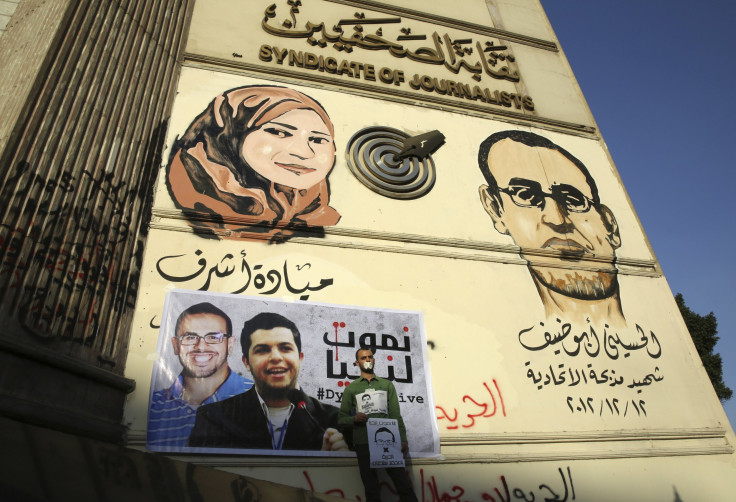Kerry In Egypt: Support For Sisi Despite Jailed Journalists

Secretary of State John Kerry visited Egypt over the weekend, voicing strong U.S. support for newly elected President Abdel Fattah el-Sisi -- a man who stands for everything revolutionaries fought against more than three years ago during the Arab Spring. Kerry’s statements on the new Egyptian government seemed to signal the U.S. has decided it must forget the revolution that President Obama once said “bent the arc of history toward justice.”
Back in 2011, the Obama administration praised the Egyptian people for defining a future that they wanted -- one without a ruthless dictator.
“The Egyptian people have made it clear that there is no going back to the way things were: Egypt has changed, and its future is in the hands of the people … They have made it clear that Egypt must reflect their hopes, fulfill their highest aspirations, and tap their boundless potential,” Obama said in a statement on Feb. 10, 2011.
Now Egypt seems to be back where it started -- under a president’s fist, with apparently rampant human rights abuses. Just a day after Kerry’s trip to Cairo, a judge convicted three journalists of broadcasting false information as part of an alleged conspiracy with the Muslim Brotherhood. Two men were sentenced to seven years in prison and the third, to 10 years. “Today’s conviction is obviously a chilling and draconian sentence,” Kerry said. He told reporters that he “immediately picked up the telephone” to call Egypt’s foreign minister “and registered our serious displeasure at this kind of verdict.”
Still, Kerry had met with Sisi and pledged to continue the flow of U.S. military aid to the country. The administration apparently feels that the need for a stable partner in Cairo is paramount -- and that given Sisi’s election victory (however questionable), there were no viable options for opposing the general. Cairo and Washington have concerns about unrest in Iraq and Libya in common, as well as fears of terrorism.
"There is a sense of resignation in Secretary Kerry’s statements. You could not have expected this even a year ago,” Kiron Skinner, a research fellow at the Hoover Institution, said. “The Arab Spring seems to have brought us full circle. We are accepting an Egyptian government we may not have accepted back during the Arab Spring.”
But Egypt is not alone.
The revolutions that spread across the Middle East during the Arab Spring seem distant now. Several countries including Egypt, Syria and Libya appear to be battered by years of political unrest and attempts at democracy.
“We have seen dictators fall and seen new forms of authoritarian rule. The whole arc of the Middle East is not becoming the democratic experiment the Obama administration had been trying to foster during the Arab Spring,” Skinner said. “So the governments have new actors in power but some of the same types of behavior that helped foment sectarian behavior before are taking place across the region again.”
Kerry’s visit to Egypt is part of his tour of the Middle East as he seeks support for the creation of a new government in Iraq -- an issue that many U.S. politicians thought had been resolved following the U.S. led invasion in 2003.
The countries Kerry is asking for help on his tour, including Egypt, are struggling with their own political battles and seem unable to provide any tangible support to restore order in Iraq.
“The unravelling in Iraq is the subtext of the shift of our position in Egypt,” Skinner said. “The decision to give the installment of $650 million in military aid to Egypt comes as comes as Iraq is unravelling. We have an Iraq that is back to the sectarian violence and we are back to a country that is not sovereign.”
© Copyright IBTimes 2024. All rights reserved.





















